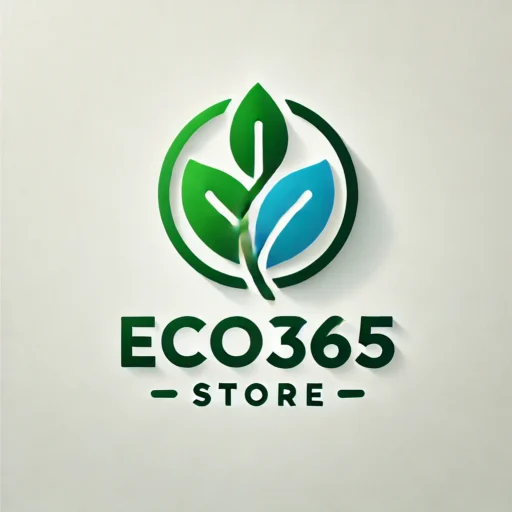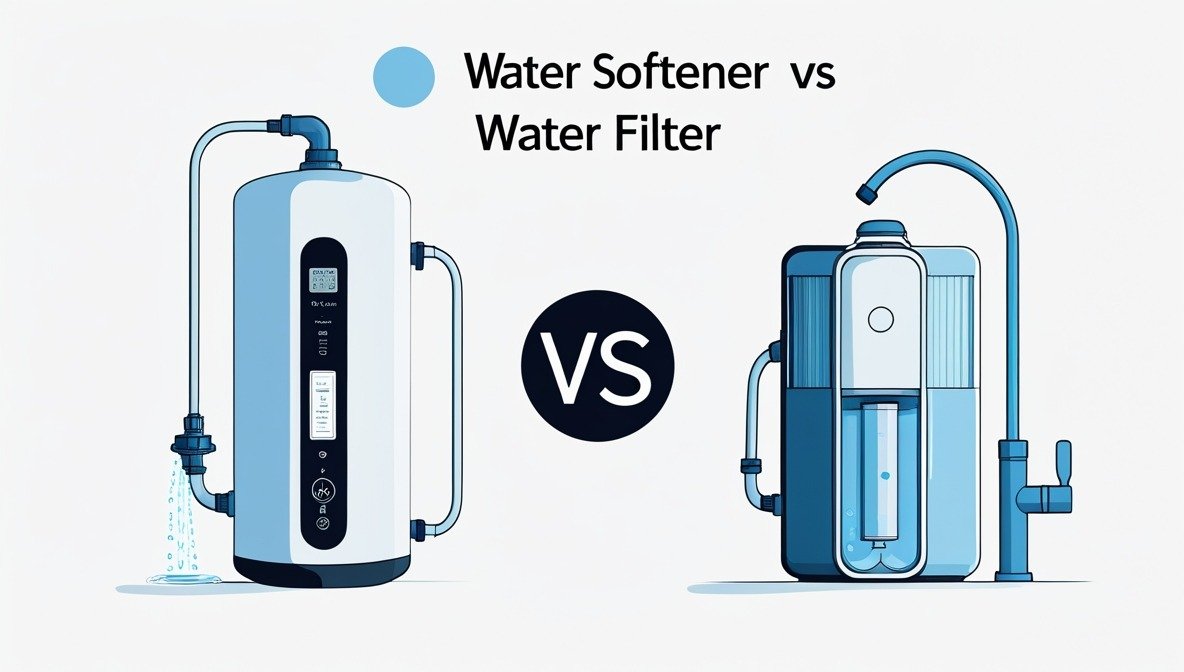Ever wondered why some water feels silky smooth while other water leaves stains on your sink? That’s because not all water is the same! When it comes to improving water quality, many people debate the Water Softener Vs Water Filter difference—but these two systems serve different purposes.
A water softener removes hard minerals like calcium and magnesium, preventing scale buildup in pipes and appliances. Meanwhile, a water filter eliminates contaminants like chlorine, sediment, and bacteria, making water cleaner and safer to drink.
Both systems help protect your health and home, but choosing the right one depends on your water problems. Let’s break down their differences to help you make the best choice!

What is a Water Softener?
A water softener is a device designed to remove hardness-causing minerals—primarily calcium and magnesium—from water. Hard water can cause scale buildup in pipes, appliances, and fixtures, reducing efficiency and increasing maintenance costs. A water softener helps prevent these issues and enhances overall water quality.
How Does a Water Softener Work?
Water softeners use an ion-exchange process to replace calcium and magnesium ions with sodium or potassium ions. Here’s how it works:
- Resin Beads Attraction: Hard water flows through a resin bed filled with negatively charged beads that attract positively charged calcium and magnesium ions.
- Ion Exchange: As the hard water minerals stick to the resin beads, sodium or potassium ions are released into the water.
- Regeneration Cycle: Over time, the resin beads become saturated with hardness minerals. The system then flushes them out using a brine solution (salt water), replenishing the sodium or potassium ions.
Benefits of a Water Softener
✅ Prevents Scale Buildup
Hard water leads to scale formation in pipes, faucets, and appliances, reducing their efficiency. A water softener prevents clogging and extends their lifespan.
✅ Improves Soap & Detergent Effectiveness
Soft water enhances the lathering and cleaning power of soaps, shampoos, and detergents, allowing you to use less product while achieving better results.
✅ Extends Appliance Lifespan
Appliances such as water heaters, dishwashers, and washing machines work more efficiently and last longer without mineral buildup.
✅ Reduces Water Spots & Streaks
Soft water eliminates chalky white residue on dishes, glassware, and bathroom surfaces, making cleaning easier.
What is Hard Water?
Hard water is water that contains high levels of dissolved minerals, primarily calcium and magnesium. These minerals are naturally absorbed as water flows through limestone, chalk, or gypsum deposits. While hard water is not harmful to health, it can cause damage to plumbing, appliances, and skin.
How to Identify Hard Water
You might have hard water if you notice:
✔ White, chalky residue on faucets, sinks, and showerheads (limescale buildup).
✔ Spots or streaks on glassware after washing.
✔ Poor soap lathering—hard water reduces soap’s effectiveness.
✔ Dry skin and hair after bathing.
✔ Frequent appliance breakdowns due to mineral buildup in water heaters, dishwashers, and washing machines.
What is a Water Filter?
A water filter is a system designed to remove contaminants and impurities from water, enhancing its taste, odor, and safety. These filters target various pollutants, such as chlorine, bacteria, heavy metals, and sediments, ensuring cleaner and healthier water for consumption.

Types of Water Filters
Different water filters are designed to tackle specific contaminants. Here are the most common types:
✅ Activated Carbon Filters
- Effectively remove chlorine, volatile organic compounds (VOCs), and other chemicals that affect taste and odor.
- Ideal for improving drinking water quality and reducing unpleasant smells.
✅ Reverse Osmosis (RO) Systems
- Use a semi-permeable membrane to eliminate a broad spectrum of contaminants, including lead, nitrates, arsenic, and fluoride.
- Provide some of the purest drinking water but may also remove beneficial minerals.
✅ Ultraviolet (UV) Filters
- Utilize UV light to disinfect water, neutralizing bacteria, viruses, and other microorganisms.
- Best suited for biologically contaminated water sources.
✅ Sediment Filters
- Remove dirt, rust, and sand particles from water, preventing clogging in plumbing and appliances.
- Often used as a pre-filter in multi-stage filtration systems.
Benefits of a Water Filter
Provides Safer Drinking Water – Removes harmful contaminants, reducing exposure to toxins like lead, pesticides, and bacteria.
Improves Taste & Odor – Eliminates chlorine and other chemicals that cause unpleasant smells and flavors.
Reduces Health Risks – Minimizes the risk of waterborne diseases and long-term health issues caused by contaminated water.
Eco-Friendly Alternative to Bottled Water – Helps reduce plastic waste and lowers environmental impact.
What is Difference Between Water Softeners vs. Water Filters
| Feature | Water Softeners | Water Filters |
| Primary Function | Removes hardness minerals (calcium & magnesium) | Eliminates contaminants like chlorine, lead, bacteria, and sediments |
| Main Purpose | Prevents limescale buildup in pipes and appliances | Provides cleaner, safer drinking water |
| Targeted Issues | Addresses hard water problems and prevents plumbing damage | Removes harmful substances that affect water taste, odor, and safety |
| Impact on Water Quality | Produces soft water that lathers better with soap | Delivers purified water free from chemicals and pollutants |
| Best For | Homes with hard water that causes scaling issues | Households concerned about water safety and contamination |
| Drinking Water Safety | Does not remove contaminants; only reduces hardness | Ensures safe drinking water by filtering impurities |
| Common Technologies | Ion exchange (sodium or potassium-based softening) | Activated carbon, reverse osmosis, UV purification, and sediment filtration |
| Effect on Skin & Hair | Helps reduce dryness and irritation caused by hard water | Improves water purity but does not alter hardness |
| Appliance Protection | Extends lifespan of water heaters, dishwashers, and pipes | Removes harmful elements but does not prevent scaling |
Do You Need a Water Softener, a Water Filter, or Both?
Choosing between a water softener, a water filter, or both depends on your water quality concerns. Conducting a water test is the best way to determine hardness levels and contaminants present in your water supply.
Assessing Your Water Quality
🔬 Water Testing: A professional test or a home water test kit can help identify mineral content (hardness), chlorine, lead, bacteria, and other contaminants.
Signs You May Need a Water Softener
A water softener is recommended if you experience:
✔ Frequent limescale buildup on faucets, showerheads, and appliances.
✔ Dry skin and hair after showering, caused by mineral-heavy water.
✔ Reduced efficiency of water-using appliances, like water heaters and dishwashers, due to scale accumulation.
🛠 Solution: A water softener prevents scale formation, improves soap efficiency, and extends the lifespan of plumbing and appliances.
Signs You May Need a Water Filter
A water filter is the right choice if you notice:
✔ Unpleasant taste or odor in drinking water, often caused by chlorine, sulfur, or other chemicals.
✔ Concerns about specific contaminants such as lead, pesticides, bacteria, or sediments in your water supply.
✔ Desire for overall improved water purity for drinking, cooking, and personal use.
🚰 Solution: A water filter ensures clean, safe, and great-tasting drinking water by removing harmful impurities.
Considering a Combined Approach
In some cases, both systems are necessary:
🏡 Hard water + Contaminants – Homes with high mineral content and chemical pollutants benefit from a water softener + filter combo.
🚿 Softened but Contaminated Water – A softener removes hardness, but a filter is needed for bacteria, chlorine, or heavy metals.
💧 Well Water Users – Well water may have both hardness minerals and biological contaminants, requiring dual treatment.
Which System is Right for You? Water Softening Vs. Water Filtering System
| Concern | Water Softener | Water Filter | Both |
| Hard water & scale buildup | ✅ Yes | ❌ No | ✅ Yes |
| Dry skin & hair from showering | ✅ Yes | ❌ No | ✅ Yes |
| Unpleasant taste/odor in drinking water | ❌ No | ✅ Yes | ✅ Yes |
| Heavy metals, chlorine, bacteria concerns | ❌ No | ✅ Yes | ✅ Yes |
| Appliance efficiency & plumbing protection | ✅ Yes | ❌ No | ✅ Yes |
Conclusion: Choosing Between a Water Softener and a Water Filter
Deciding between a water softener and a water filter depends on your specific water quality concerns. If you struggle with hard water, a softener will prevent limescale buildup, protect appliances, and improve soap efficiency. On the other hand, if you are concerned about contaminants like chlorine, lead, bacteria, or other impurities, a water filter will ensure clean, safe, and great-tasting water. In many cases, using both systems together provides the best overall solution, especially in homes where water contains both hardness minerals and pollutants. To make an informed decision, it’s essential to test your water and choose the right system to protect your health, home, and appliances. Investing in the right water treatment solution ensures better water quality, improved efficiency, and long-term savings.
Is a water softener considered filtering the water?
No, a water softener only removes hardness minerals; it does not filter contaminants.
Do I need a water filter and a water softener?
If your water has both hardness minerals and contaminants, using both is recommended.
What is better, water filtration or water softener?
It depends on your needs—softeners treat hard water, while filters remove contaminants.
Is it safe to drink softened water?
Yes, but softened water contains added sodium, which may not be ideal for some individuals.
Do water filters remove calcium?
Only certain filters, like reverse osmosis, effectively remove calcium from water.

Anamika is a passionate writer for Eco365Store.com, specializing in topics that inspire a cleaner, greener world. With expertise in home cleaning, recycling, and eco-friendly solutions, she crafts engaging and informative articles that help readers adopt sustainable practices in their daily lives.

